As I reflect on this year’s session, I want to not only list some of the legislative accomplishments of the 99th legislature but also give you an idea of the broad set of issues that were present in the 37-day session that was just completed. Of course, the most important goal of any legislative session is passing a structurally sound balanced budget that makes investments in people and programs that continue and enhance our way of life in South Dakota, and we (as legislators) are happy to say that goal has been accomplished. The following are some of the accomplishments of this year’s session.
Education Reforms: 1.) the new budget funds a 4% increase in spending for K12 and Technical Institutes, 2.) a new accountability program was created to ensure future increases to teacher pay, 3.) a $6 million dollar investment in a literacy education program providing professional development to teachers in the subject of literacy education on the science of reading, 4.) and the creation of a career and technical education instructor permit to certify qualified individuals to help fill teaching positions that are going unfilled because school districts are unable to hire traditional certified educators to fill certain teacher vacancies.
Workforce Measures: 1.) the new budget provides the 3rd consecutive tuition freeze for University and Technical School students enhancing the chance that we can keep our high school graduates in state to pursue their education and related career(s) in South Dakota, 2.) a new measure expands the eligibility for professional licenses for former convicts, 3.) streamlining medical licenses for registered nurses, psychologists, social workers, and counselors to bolster our availability to these professionals through multi-state compacts, 4.) the new budget gives a 4% raise to state employees so that we can continue to attract and the retain a professional state workforce.
Public Safety: 1.) the new budget funds construction of a new medium-security Women’s Prison in Rapid City, 2.) the new budget begins funding for a new Men’s Prison to replace the aging state penitentiary in Sioux Falls, 3.) and a new measure that creates the statewide office of indigent legal services to reduce the burden to counties for providing legal services to citizens.
Public Health: 1.) the new budget funds a 4% increase to Medicaid providers (health care professionals and facilities enrolled to provide services for people who qualify), 2.) a measure to fund investments for nursing homes to purchase and install technology for telemedicine, 3.) and an additional $7 million in funding for nursing homes and community providers.
Agriculture: 1.) a measure to strengthen regulations restricting foreign-owned agriculture land, 2.) an appropriation to fund the construction of a multipurpose “Sheep Shed” at the South Dakota Fairgrounds in Huron, 3.) and several measures that enhanced landowner protections when linear projects (pipelines, energy transmission facilities, solar/wind energy facilities) are proposed to be constructed and easements are pursued.
Miscellaneous: 1.) a new program to fund cybersecurity services and protections for counties and municipalities information technology assets, 2.) a business-friendly initiative for the regulation of autonomous vehicles for commercial use, 3.) and a measure to incentivize the sale of more ethanol through the creation of an E-15 fuel program for retailers.
In closing, each legislative session has topics that yield emotion from constituents and visitors and this year the most controversial issue revolved around the 12 bills that our House Commerce and Energy Committee heard regarding some kind of allowable management of pipelines and the products that are transmitted through them. Each piece of legislation we considered had details that took hours to study, discuss, and contemplate on as we weighed existing laws and recent court decisions.
Thank you for the opportunity to serve District 24. If you have any questions or thoughts, please email me at Mike.Weisgram@sdlegislature.gov.
–mw
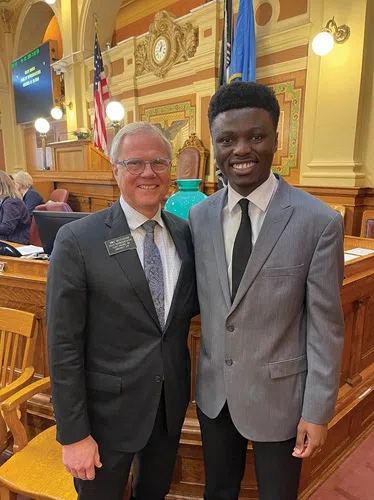
Representative Mike Weisgram with Finieus Epapy, a Legislative Intern who served the Commerce and Energy Committee.
Courtesy photo.
Legislative Update Week 7 – Session 2024 by District 24 Representative Mike Weisgram.
After the long three-day weekend, I was ready to get back to work. Seemingly, when I gear up to be productive and accomplished, I am motivated to get down to business. That being said, this has been the attitude of our leadership team all session. Speaker Bartels and Majority Leader Mortenson have encouraged an aggressive work agenda with efficiency in bill hearings and actions. They run a tight ship and it paid off as our most grueling day, Crossover Day, was just a regular day of manageable bill hearings and thoughtful final actions of remaining House bills. In contrast, my first two years of legislative service, we were here till after midnight on Crossover Day with pages of bills on our agenda and fatigue likely affecting decisions made on those bills. To conclude, my hat’s off to the Speaker and Majority Leader who set goals with good government as the priority and respectful communication to all House members and our LRC staff.
Last week I mentioned “ongoing” and “one-time” revenue estimates that were expected to come in slightly higher than earlier projections. What I didn’t mention, were my thoughts of where I’d like to see investments made and why. Leadership has asked us to start ranking some of our priorities in spending as we work towards a balanced budget of revenues and expenses. If possible, I would like to see us favor one more year of freezing tuition at South Dakota public universities and technical schools. With workforce still being the number one most challenging problem in our state, keeping universities and technical colleges affordable (in my opinion) is the most effective way to attract and retain more young people to our state. It’s unclear how much that would cost in ongoing funds, but I think it would be at least a five-million-dollar investment. I would like to think this investment would pay big dividends in expanding the opportunities for our kids and grandkids in the state, while attracting out-of-state high school graduates. We will see how the numbers come in and what the spending priorities of other
legislators’ figure into the final budget.
One of the hot topic issues this year is nearing a final decision in the Senate. HB 1099 is legislation that expands the scope of practice that Optometrists may offer. The profession is seeking legal approval for five new procedures, some of which include using lasers and injecting anesthetics to remove skin tags. Although there has been stiff opposition from the SD State Medical Association and the SD Academy of Ophthalmology, HB 1099 passed Wednesday in the Senate Health and Human Services Committee and I expect it to come up in front of the Senate body early next week.
Thank you for your interest in these updates and if you have any thoughts or questions, please contact me at Mike.Weisgram@sdlegislature.gov.
–mw
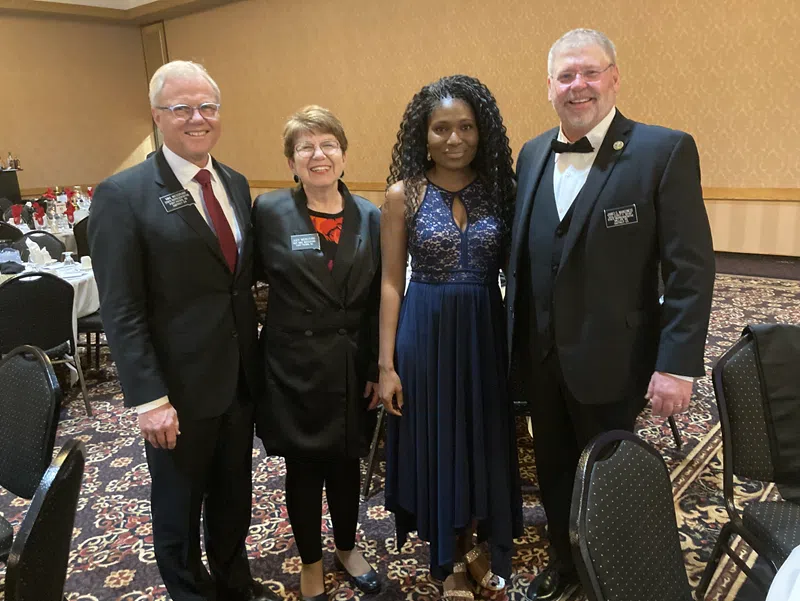
Mr. & Mrs. Weisgram (District 24) with Mr. & Mrs. JD Wangsness (District 23) at the Military Ball. Feb. 2024.
Courtesy photo.
Legislative Update – Session 2024 Week 6, by District 24 Representative Mike Weisgram (Feb. 15, 2024).
The mantra this week was to work diligently to get ready for “crossover day.” Crossover day is a deadline for the last day for a bill (legislation) to pass out of the chamber (House or Senate) in which it was introduced and move forward for consideration in the opposite chamber. Crossover day this year is next Wednesday, February 21st so it was imperative that committees work through the bills assigned to them in preparation for next Wednesday.
For me, the biggest challenge this week was to shepherd eleven bills through the House Commerce and Energy Committee. Many of them were very controversial with lengthy testimonies, many pertinent questions being asked, and a generous amount of time needed for committee members to deliberate and decide how they would vote. The most controversial was HB 1219 which we heard Monday morning (and into the evening). It dealt with the proposed carbon dioxide pipeline and whether or not the developer of the project would have eminent domain authority if the product being shipped through the pipeline (liquified carbon dioxide) was to be stored rather than being used in a traditional “public use” product or commodity. HB 1219 is only a one sentence bill but has significant meaning to the project developer and landowners whose land must be crossed on the pipeline route. The bill would basically remove eminent domain for the carbon pipeline if the commodity being shipped was to be stored. The bill hearing took one hour and twenty minutes with much emotion displayed, opinions conveyed, and facts being presented. Committee members voted 7-6 to defeat the bill but that decision was challenged by the bill sponsor, and he had enough support in the House to have it “smoked out” or reconsidered. Further action on this bill will happen on Tuesday as we must move it along to the next chamber by end of the workday Wednesday. It’s worth noting that a similar bill to this one was heard last year where it passed the House but failed in the Senate.
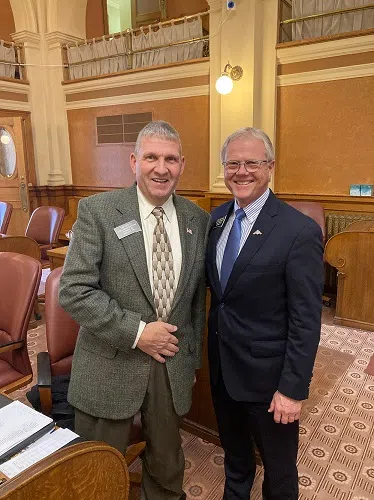
District 24 Representative Mike Weisgram with Representative Tim Reisch from District 8.
Courtesy photo.
Legislative Update – Session 2024 Week 5, by District 24 Representative Mike Weisgram. (Feb. 9, 2024).
My favorite legislative committee to serve on, is the House Commerce and Energy Committee. They meet on Mondays, Wednesdays, and Fridays, and I am honored to serve as the Chairman. We cover a broad range of proposed legislation that involves in-state and interstate business transactions, telecommunications, food and drug safety, and the supply and delivery of energy. With many years of business ownership experience, I find the committee work fascinating. It’s continually complicated and not surprisingly, emotional. People’s livelihoods are affected by these legislative offerings. With that, I understand it’s more than a dollar and cents thing.
On Monday, February 5th, our committee heard and deliberated on five separate bills related to the construction of a carbon transmission pipeline in central and eastern South Dakota. Just a short reminder of this topic, fourteen ethanol plants in South Dakota want to join a proposed project to move carbon dioxide (a by-product that occurs when ethanol is produced) through a pipeline to an underground storage facility in North Dakota. These ethanol plants would all be connected to a main pipeline that would traverse private and public lands on the way to North Dakota. With over 500 landowners involved, not everyone is happy about the pipeline coming across their property. The five bills we heard on Monday (committee proceedings took five hours to hear them) tried to either find balance in protecting and respecting landowner rights while keeping the project viable, or redefine what kind of materials could be transported in pipelines, or kill the proposed project all together. The outcome of the meeting(s) resulted in three bills passing and two being defeated. With legislation needing to be passed by two committees, the two full chambers (House and Senate), and needing the Governor’s signature to become law, it’s way too early to predict the outcome. Besides, our committee will be hearing five more pipeline bills on Monday the 12th. By far, this is the most talked about topic of the session.
Speaking of emotions, at the House State Affairs Committee meeting on Wednesday, pro-life and pro-choice advocates engaged in a debate over a proposed ballot measure that would legalize abortion. Center stage was HCR (House Concurrent Resolution) 6008 that opposes an initiated measure to place the right to an abortion in the Constitution of South Dakota. A group named Dakotans for Health is currently seeking signatures for an initiated constitutional amendment petition to place this right to an abortion on the ballot at the general election on November 5, 2024. HCR 6008, of which I am a co-sponsor, makes it clear that the proposed abortion amendment removes protection for mothers, children, and healthcare providers and for many of us, it’s an extreme measure that is not in the best interest of South Dakotans.
In my opinion, pro-abortion groups pushing the pro-abortion ballot measure want medical providers and the public to believe women can’t receive proper care. It’s true that elective abortions are not allowed in South Dakota, but a woman can be treated for a miscarriage or ectopic (abnormal) pregnancy at any time. A woman can be treated to save her life at any time even when it means the baby, sadly, does not survive. Another piece of related legislation that is coming up for a hearing soon is HB 1224. If passed, this legislation directs the Department of Health to create a video and other materials that describes the state’s current abortion law and medical care for a pregnant woman experiencing life-threatening or health-threatening medical conditions. When completed, the department would make the video and materials available on its website providing accurate and easily understood information.
In closing, it was an emotional week. It concluded with good work being done by good people trying to do their best. Citizen legislators trying to separate emotion from fact and making good decisions for South Dakota. Thank you for your interest in these updates and please don’t hesitate to contact me at Mike.Weisgram@sdlegislature.gov.
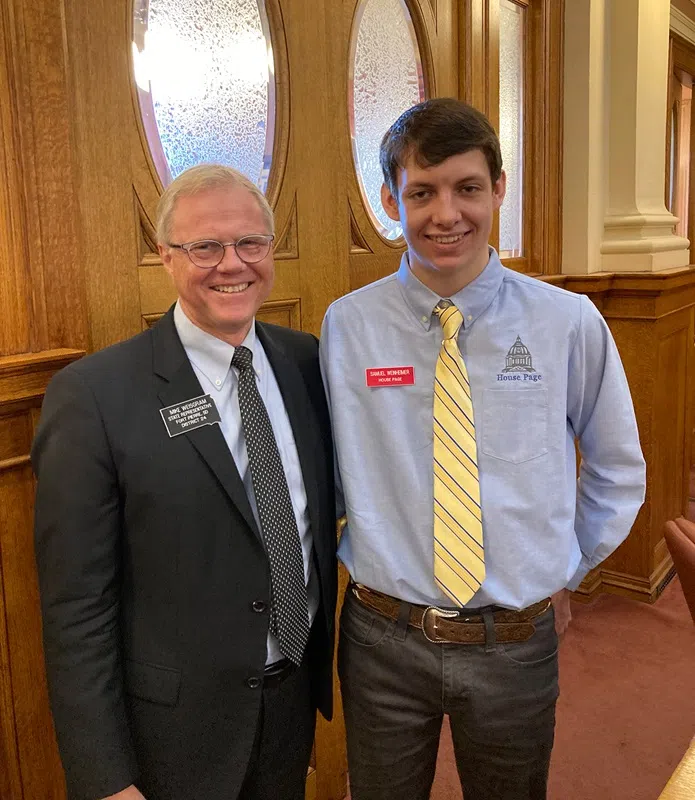
Representative Mike Weisgram with Samuel Weinheimer, House Page.
Courtesy photo.
Legislative Update – Session 2024 Week 4, by District 24 Representative Mike Weisgram. (Feb. 3, 2024).
With the close of new bill introductions now complete, week 4 gave more clarity to the workload and breadth of topics that this year’s session presents. As I was trying to get a sense of how I was going to schedule and successfully hear 20 more House Bill hearings for 5 more regular scheduled meetings, I did find myself humming a number 1 hit song from 1972: “I can see clearly now the rain is gone.” Yes, I am aware of how that dates me… but I’m okay with that.
Two things stood out for me this week: House Bill 1099 which expands the scope of practice for an Optometrist and Governor Noem’s address to a Joint Session of the South Dakota Legislature regarding the mass illegal immigration that’s happening on our southern border. Regarding HB 1099, Optometrists in our state are asking to perform additional procedures that they are trained to do. HB 1099 would allow optometrists to treat styes by injection, remove skin tags, use light to treat dry eyes, and use two in-office laser procedures to treat glaucoma and after-cataract surgery care. Their testimony attested to the complex nature of this expanded care, but they also demonstrated much confidence because of their education and training. Despite the training they receive in optometry school, this bill would require optometrists that want to practice in this expanded care to complete additional training, pass national exams, pass an expanded procedure course, and demonstrate their competency on human eyes in a setting proctored by an ophthalmologist. Opponents to HB 1099 are numerous: American Medical Association, SD State Medical Association, SD Dermatology Society, and SD Ophthalmologists. They made clear their position that patient safety and quality of care is their main concern and concluded that optometrists performing these procedures would pose a serious threat to the safety of patients in South Dakota. In a rare happening, and because of one member of the committee was on an excused absence, the House Health and Human Services committee were tied in the vote to pass or kill the bill. 6 – 6 was the bill score, which was an unusual outcome. The solution came as the committee voted 8 – 4 to move it to the full House (69 members) without recommendation, where it will be heard and voted on Monday. More to come on this one next week.
Governor Noem delivered an impassioned speech regarding the ongoing crisis at the Texas border and the failed security policy of our federal government. Recognizing that our country was proudly built on the stories of our ancestors who came to this country for opportunity and a new beginning, she pointed out a stark contrast and the realization of our southern border being overwhelmed with mass illegal immigration that is bringing drugs, trafficking, crime, and violence. Even though South Dakota is miles away from the Texas border, we are affected by the cartel presence on our tribal reservations. The drain on resources at the local, state, and federal level alone makes this a crisis in every state. Nearly three years ago and again last summer, South Dakota sent National Guard soldiers to Texas to help with surveillance of drug traffickers and border securing. The Governor’s message shared the full scope of the crisis and how it effects South Dakota. She is consulting with the Adjutant General, Secretary of Public Safety, and others as to what our options are to provide personnel. Her communication to us was valued and much appreciated.
Thank you for your interest in my weekly updates. I always appreciate your comments and questions.
–mw
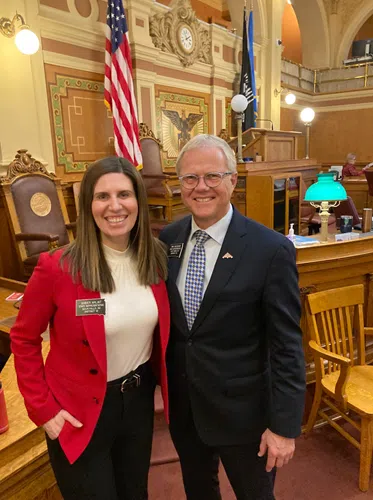
District 12 Representative Amber Arlint and District 24 Representative Mike Weisgram.
Courtesy photo.
Legislative Update – Session 2024 Week 3, by District 24 Representative Mike Weisgram.
It was a good week and there were a few topics that garnered much interest, emails, and phone calls. I’m referencing HB 1095 that established provisions for the operation of automated (autonomous) motor vehicles and SB -56 permitting the operation of electric bicycles on the Mickelson Trail.
Before I get into the details of the two aforementioned bills, I indicated last week that I would elaborate on HB 1079. It was defeated in the House Commerce and Energy committee, that I chair. This has relevance in our District 24 because the CO2 proposed pipeline would be placed in parcels in Sully and Hyde counties. As mentioned last week, this project does not have 100% support with the affected landowners. They deserve time to express their valid concerns of companies coming on their land to do surveys for proposed projects without proper notification and permission. HB 1079 would have not allowed survey companies to come on someone’s land without written consent for entry at an appointed date and time. For a project to be built, such as a pipeline, a siting permit is sought by developers of the project from the Public Utilities Commission (PUC). For a siting permit to be issued, the PUC would need surveys of the affected lands to know of terrains, types of soils, challenges, or surprises that lands would pose in proposing the route of the pipeline. I think the difficulty with the bill, and why it was defeated in committee, was that if a company proposing the project needs the survey to get a siting permit, yet they couldn’t perform the survey because of permission couldn’t be obtained, then the project (regardless of the merits) could never be built. I assume the bill was brought because some of the survey subcontractors who went on people’s land didn’t seek the courtesy of permission or respect of the landowner’s property. As much as the committee was sympathetic of the people who testified for this bill, it didn’t seem workable that if the PUC needs the survey information to consider any proposed project, and the developer can’t get a survey because of this permission clause, then how can the needed information be presented for an informed decision to be made? One opponent testifier took issue with “the chicken or the egg” situation the bill would present. I think that summed up the feeling the bill had with the majority of committee members and why it was defeated.
If you’re driving a vehicle with adaptive cruise control or a lane-keeping feature, you’re driving a semi-automated or autonomous vehicle. HB 1095 brought to light that there are 5 levels of automated vehicles, from just having cruise control to commercial vehicles that are fully automated and do not have a human driver. And guess what, all of them are unregulated in South Dakota. I think every legislator agreed that some legislation needs to exist for our Department of Transportation (DOT) professionals to write rules around their operation and registration/fee schedule. HB 1095 was the framework of regulation that was put together by the DOT, law enforcement, truckers and retailers’ associations, and city government officials so that needed regulations, guidelines, and fee structures could be developed. While safety is the priority, having a good program would be helpful for commerce. There was some lively debate. Many questions were asked about autonomous vehicle operations and if their safety records were public, also whether electric automated vehicles are paying enough registration fees. The bill passed with the sentiments that we must get ahead of this pending use of autonomous vehicles and get on with needed regulation.
Game, Fish, and Parks (GF&P) sponsored SB 56 that permitted the use of e-bikes on the Mickelson Trail in the Black Hills. I must admit I knew little about the classifications of electric assist bicycles, but now I’m a lot more informed. Currently the trail is marketed as “non-motorized” with only safety motorized vehicles being allowed. With the popularity of e-bikes on the rise, and businesses renting e-bikes to those who desire to ride the Mickelson Trail, GF&P was trying to get ahead of this popular form of recreation. The bill started in the senate and an amendment was placed on the bill to allow class I e-bikes only, and that version of SB 56 passed. When the bill got over to the House (Agriculture and Natural Resources committee), GF&P felt the bill was going in the wrong direction and asked that the bill be tabled. With so many e-bikes being class II or III, they wanted to do more research to see what makes sense for both safety and pleasure. I heard from several trail walkers and joggers that some e-bikers are not respectful nor do they operate their e-bikes safely. For the moment, it’s status quo until more information comes forward and GF&P has another proposal.
One thing I’ve learned from being a city councilman, and now a legislator, it’s hard to legislate good behavior. With that, thank you for reading and the opportunity to serve District 24.
–mw
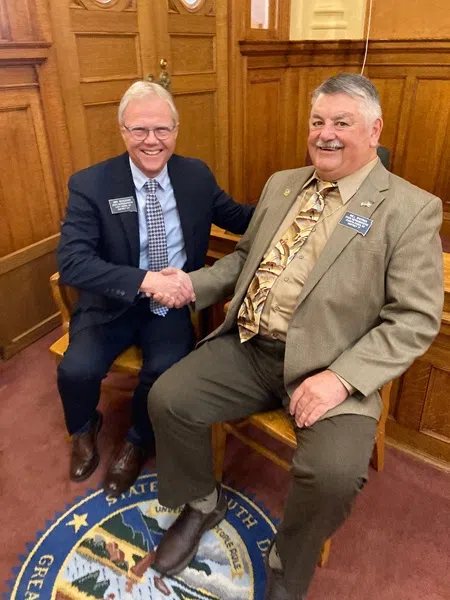
Representative MIke Weisgram (District 24) with Representative Bill Shorma (District 17).
January 19, 2024, Legislative Update – Session 2024 Week 2, by District 24 Representative Mike Weisgram.
The pace of this week’s session was brisk. In my short tenure as a Representative (this is my 4th Session) I’ve never seen the committees get to work with bill hearings and actions so quickly. Legislators are not shy to introduce bills, resolutions, and commemorations. As of Friday afternoon, I saw a total of 251 pieces of legislation. It’s a fast start and everyone seems to have their heads down as they prepare for each day’s business. I commend Speaker Bartels and Leader Mortenson for their determination in making the most of the 38-day session with their upfront communication skills and follow through. Also, the “work together” attitude between the House, Senate, and Executive Branch is the best I’ve ever seen. Kudos to them, their leadership team, and the LRC staff.
As legislation made its way through the House this week, several issues and bills stood out to me and there was great interest and discussion over the following: 1) Our state being able to join licensure compacts (for social workers, advanced practice registered nurses, and counseling) to hopefully increase our health care workforce. 2) Updating a current statute that allows the governor to apply to the Nuclear Regulatory Commission (NRC) for “Agreement State” status (this would be the first step in getting a state ready for a nuclear-powered electric generation plant). 3) Pipelines and property owner permission, allowing companies to conduct surveys when authority for eminent domain is present. Let me try to elaborate on these.
Licensure Compacts – Joining multistate compacts (agreements between states) make professional licensing easier to navigate for workers (in the respective mentioned fields) by streamlining an application process to practice in multiple states. With the advancement of telehealth services, the opportunities for our health care centers to employ (or have access to additional professional practitioners) has been expanded. By joining these compacts, hopefully more professionals will be attracted to practice in our state thus filling positions that currently unfilled. Workforce challenges continue to receive much attention in the legislature. The only hesitation I heard legislators’ debate about was to make sure these new practitioners follow the high standards of our state for health care professionals. After the questions were asked and deliberated on, all three compact bills passed and will go to the Senate for consideration.
Nuclear Power – HB 1071 was inspired by the interest of an instate investor-owned utility company to invest in a small 4th generation nuclear plant for electric power generation. Also, an informational paper (Issue Memorandum 2023-06) published this year by our LRC on the status of nuclear power was helpful to determine if South Dakota was ready for such a facility. The purpose of HB 1071 was to update the current statute 34-21-3 so if a governor of our state was to ever apply for “Agreement State” status with the US Government for limited nuclear regulatory authority, the application would be going to the correct agency. Although the legislation was just an update to current statute and authority, it caused some fervor in the community. As a sponsor of the bill, I received emails expressing dislike and phone calls questioning the merits of nuclear energy. Surely, I understand. After a presentation, testimony, and questions in committee and on the House floor, HB 1071 passed and now goes for consideration in the Senate.
Pipelines / Survey Permission – On Monday the House passed HB 1034. This allows the Public Utilities Commission (PUC) to site transmission facilities (pipelines) that involve the transfer of hydrogen. With this bill, any proposed project that transfers hydrogen by pipeline must be permitted by the PUC. There was not much opposition to this legislation as most recognized we must have authority to do the research on any such project. Hydrogen may be next “big thing” in energy production, but no one really knows this time. We’re just getting the state ready if this becomes a reality. The Survey Permission issue (HB 1079) is a topic that will take some article space to elaborate on. More on that issue next week.
Thank you for your interest in these updates and I appreciate the opportunity to serve District 24.
–mw
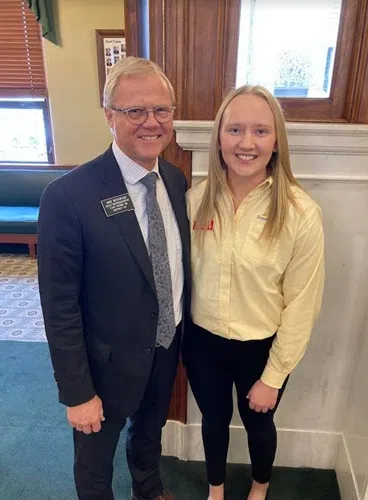
Rep. Mike Weisgram and Neva Mikkelsen, Page for the first two weeks of legislature. From the Agar / Onida area.
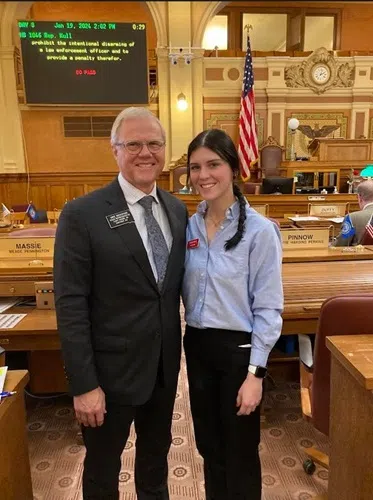
Rep. Mike Weisgram and Raegan Taylor, Page for the House. From Fort Pierre and a Junior at Stanley County.
January 12, 2024, Legislative Update – Session 2024 Week 1, by District 24 Representative Mike Weisgram.
As I pen this update, it’s Friday afternoon (Jan. 12, 2024) and the first week of session has just wrapped up. The week was filled with information from our leadership, Governor Noem, Chief Justice Jensen, Flandreau Santee Sioux Tribe Vice President Cyndi Allen-Weddell, as well as the gaggle of legislation that was presented to the legislative body. It’s worth noting how enjoyable it is to greet the returning legislators. They’ve become friends and associates with the same goal of doing the people’s work for the good of South Dakota. I also enjoy the Legislative Research Council (LRC) staff as they are very professional, friendly, and helpful.
In reviewing my notes, I found the Governor’s speech very positive and optimistic. She shared the strengths of our state and how it relates to telling our story so that we can recruit more freedom loving people to South Dakota. We can all agree that one of the most important goals is to improve our work force numbers. So many employers need trusted and dependable associates to help business grow, serve customers at a high level, and expand opportunities for all citizens. Maybe there’s been a bit of dislike for the “Freedom Works Here” campaign. However, I’m glad the Governor is trying and I think we are seeing some success from it.
Chief Justice Jensen did a masterful job with his address to the legislature. His, and the court systems, commitment to ensure due process and fairly apply the law in every case is impressive and sincere. If you have the time to find his speech online, it’s defiantly worth reading. Ms. Allen-Weddell “State of the Tribes” address was positive and realistic. She spoke about the issues that the Flandreau Santee Sioux Tribe had tackled or were still looking to find a solution to. Personally, it was one of the best state of the tribes address that I’ve heard.
Regarding legislation, there was a plethora of bills introduced as we expected a large amount of legislation to consider this year. By the looks of the first week, it will easily exceed last year’s bill introductions. Election processes, teacher pay, property rights, prohibiting daylight savings time, and medical marijuana changes are just a few topics addressed by legislation to date. I’m of the opinion that the most controversial topic will be the CO2 Pipeline, property rights, setbacks, and eminent domain conversations. To review, fourteen in-state Ethanol plants would like to join a proposal / project to transport liquefied carbon dioxide that is created as a by-product of ethanol production by pipeline to North Dakota to be buried. Affected landowners are concerned about the safety of the pipeline, its merits, and whether the company owning and constructing the pipeline should have the power of eminent domain. It’s a contentious and emotional issue with unclear consequences. Suffice to say, legislators will need to separate the facts from the emotion, weigh the positives with the negatives, and make the best decision for South Dakota. Much more to come.
As always, thank you for reading the updates and the opportunity to serve District 24. It’s an honor of a lifetime.
–mw
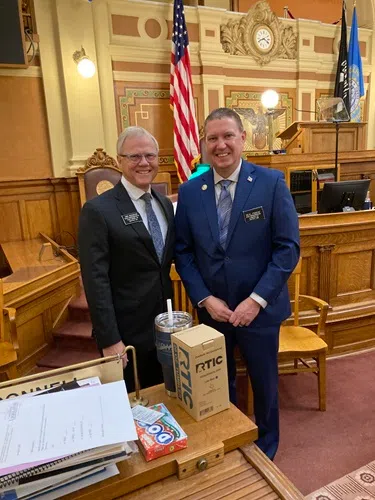
District 24 Rep. Mike Weisgram photo of the week is with Rep. Neal Pinnow from District 28B.
Courtesy photo.
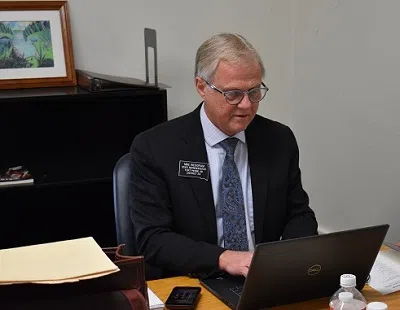








Comments